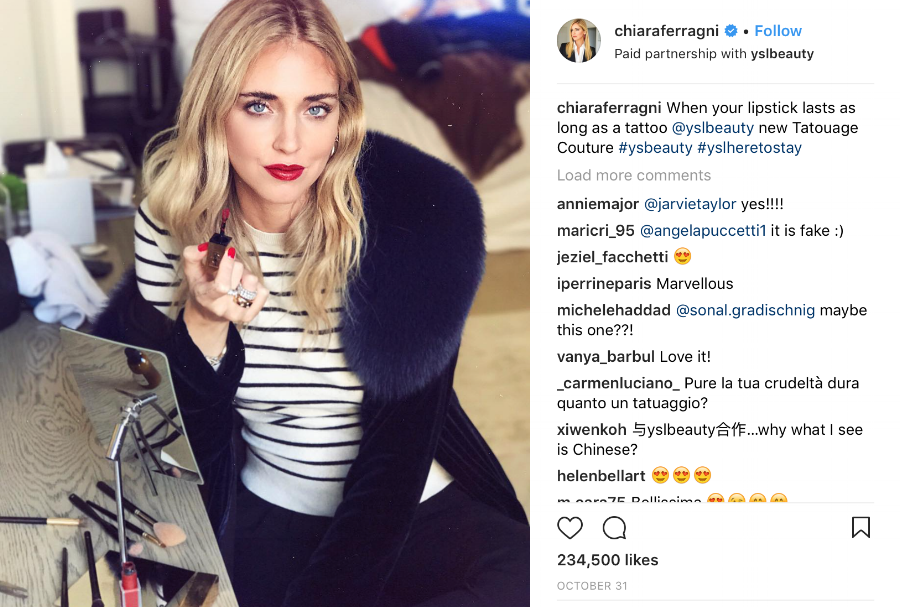
image: Chiara Ferragni Instagram
Influencers marketing is not going away. L2 Digital recently reported that a whopping 91 percent of luxury brands are using influencers in connection with their marketing efforts. With that in mind, the Federal Trade Commission (“FTC”) and its guidelines are not going anywhere, either. The government agency has long held that material connections between brands and publications – and brands and editors, brands and influencers, etc. – must be disclosed. However, much of the fashion industry has long flouted the rule, and the FTC appears to be taking notice.
Recently, the government entity, which is tasked with promoting consumer protection, and eliminating and preventing anticompetitive practices – took a number of steps, which should put the fashion industry and influencers on notice. First things first: It followed up those 90 letters it sent out this spring to remind celebrities, influencers and brands that they must clearly and conspicuously disclose their relationships when promoting or endorsing products through social media. Second, it initiated and settled a formal investigation that it commenced against two YouTube influencers.
Still yet, it issued an updated version of The FTC’s Endorsement Guides: What People are Asking, a staff guidance document that answers frequently asked questions. The newly updated version addresses a range of topics, including tags in pictures, Instagram disclosures, Snapchat disclosures, obligations of foreign influencers (yes, non-US based influencer you need to disclose, too), disclosure of free travel (yes, you need to disclose that a brand has covered your airfare/lodgings), whether a disclosure must be at the beginning of a post, and the adequacy of various disclosures like “#ambassador.”
And finally, it held a Question & Answer session on Twitter that specifically focused on influencer disclosure rules.
In light of what appears to be some ramping up by the FTC in terms of education, which very well may foreshadow impending enforcement, here are a few things brands, publications, and influencers, alike, need to know …
1. Forget Instagram and Facebook’s built-in disclosure features. They may not be valid forms of disclosure. According to the FTC, “Just because a platform offers a feature, that is no guarantee it’s an effective way for influencers to disclose their material connection to a brand. It still depends on an evaluation of whether the tool clearly and conspicuously discloses the relevant connection.”
In its Twitter Q&A, the FTC specifically called attention to Instagram, YouTube, and Facebook disclosure features, saying, “FTC staff doesn’t think that the built-in YouTube and FB tools suffice. The same applies to the built-in Instagram tool.”
2. “Partner” is NOT a valid disclosure. But, “hashtag XXPartner should be good enough when XX is brand name.” So, #PradaPartner would likely be ok, according to the FTC.
Other valid disclosures: #Ad, #Sponsored, #Paid.
Invalid disclosures?“#Ambassador is an ambiguous disclosure,” per the FTC. #Spon, #Sp, #Thanks, and #Collab are not valid either.
3. Size (and placement) matters. In addition to the actual language of disclosures, where you place your hashtags matters, too. They must be “easily noticed” aka “hard to miss.”
For instance, the FTC recently stated, “If #ad is mixed in with links, handles or other hashtags, readers may naturally just skip over all that clutter. With multiple links & hashtags, #ad may go unnoticed.”
It is “best to make it visible in the beginning [of a post] whenever possible,” per the FTC because those that are placed at the bottom of posts and/or below the “More” button on Instagram, for example, are not likely to be considered valid disclosures.
4. SNAPCHAT. You must disclose on there, too. The FTC recommends superimposing disclosure language over the photo or video.
5. The FTC does not care where you live, or where you are headquartered. What the FTC cares about is the “reasonably foreseeability” that your Instagram posts or YouTube videos or Snapchat vids “will be seen by and affect U.S. consumers.” If they will be viewed by consumers in the U.S., then U.S. law will apply and a disclosure would be required. Also, according to the FTC, “the U.K. and many other countries have similar laws and policies, so you’ll want to check those, too.”
6. It’s not just about the money. You must disclose if you have a “financial or family relationship with a brand.” Also: if you work for or with a brand but were not paid for a specific post, “you should still disclose your connection to the brand,” according to the FTC.
* This is the latest in a series of articles – entitled, The Business of Influence – dedicated to exploring the state of influencer marketing, which you will find this week on TFL.










